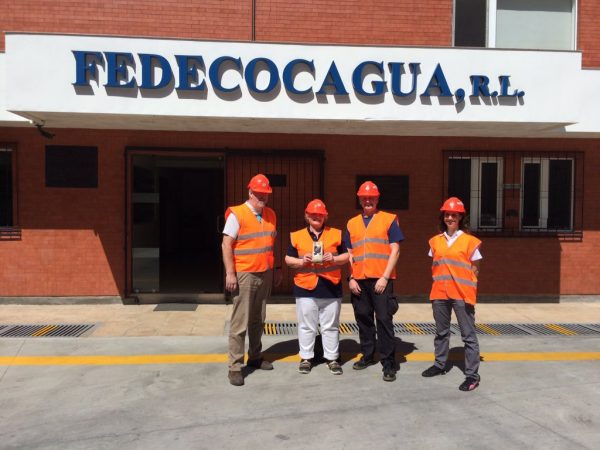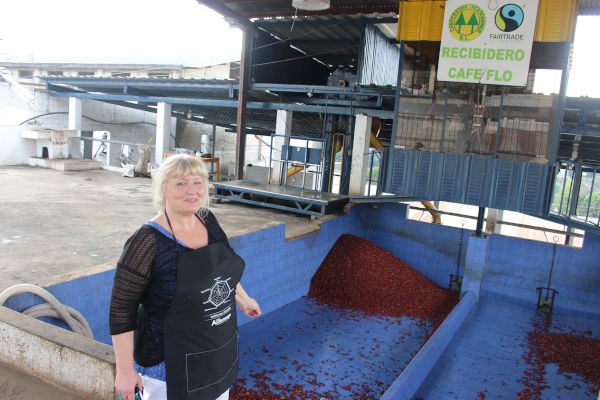This week the Midcounties Co-operative is, like many organisations, celebrating Fairtrade Fortnight (25 February – 10 March), the annual event which aims to inspire people to choose Fairtrade by showing how the organisation benefits food producers in developing countries and their communities.
Last year the society ran a competition for a member to win a once-in-a-lifetime opportunity to visit Fairtrade coffee farmers in Guatemala. The winner was Jennifer Simpson from Dorset, a library manager who helped to set up a credit union in her hometown of Christchurch with her partner, John, a co-op consultant, and championed it as a Fairtrade town.
Jennifer visited Guatemala in January, and here she writes about the trip and what it taught her about Fairtrade …
I’ve been a member of the Midcounties Co-operative since I joined as a Co-op Energy customer four years ago, and I feel very committed to the society’s values. My partner works as a consultant, helping small businesses to set up co-operatives, and we try to be a co-operative household in any way that we can. This is why we recognise the importance of supporting the Fairtrade Foundation.
I’ve been buying Fairtrade for more than 20 years now and every Christmas I give friends and family Fairtrade presents like wine, coffee and chocolate. When I saw the competition in the Summer Members’ Magazine offering the opportunity to win the ‘Ethical Adventure of a Lifetime’, I thought it sounded like a fantastic experience and didn’t hesitate to enter. I was amazed when I won, especially considering the popularity of the competition, which had more than 1,300 entries.

My partner and I left for Guatemala on 6 January and spent just over two weeks travelling around the country, visiting coffee plantations and meeting farmers who are directly impacted when you choose to buy Fairtrade. In Guatemala, half the population lives below the poverty line, so Fairtrade offers a lifeline to farmers, allowing them to feed their families.
One of the main things that I learnt is that coffee farmers work incredibly hard and it’s a very manual job. The Fairtrade mark acts as an insurance policy for farmers, so that if coffee prices decline, these farmers are still able to maintain their prices and earn a living wage. This is particularly important due to the coffee crisis in Guatemala, which means that the price paid to farmers often doesn’t even cover the cost of production, and they need to resort to growing other types of crops to support their families.

More than this, Fairtrade helps to provide an infrastructure for the farmers – and we visited some of the factories where they process the coffee. Some communities have their own small factories and we also visited one larger, mechanised plant that was partly funded by the Fairtrade Foundation.
Buying Fairtrade can also help to fund various projects that improve farmers’ working conditions and the quality of their crops. For example, the Foundation replaced the roof on one of the barns that we saw, meaning that the coffee beans could be kept protected and dry without being damaged by rainfall.
Additionally, the roads in Guatemala can be quite poor and communities need four-wheel drives to get around. Money from Fairtrade helped farmers to buy these vehicles which is life-changing for those living in small, rural communities. Being Fairtrade certified helps these communities with healthcare and education, supporting clinics and schools, too.
In terms of farming the crop, Fairtrade helps to pay for technical assistants that visit the farms to help with agricultural issues. One farm we visited was also growing a lot of avocados as back-up ‘cash crop’. The technical assistants were able to advise them on the number of avocados that they could grow without this negatively impacting the quality of the soil, which would in turn damage the coffee bean.
Fairtrade is about much more than just the guaranteed price. There is a very human benefit, and the organisation looks after farmers it works with. It really demonstrated how important it is and it made me feel so pleased that I have been committed to buying Fairtrade whenever I can.
My highlight of the trip was meeting the farmers in Guatemala as they take such pride in their coffee – it was fascinating seeing where it comes from.
I’m keen to share everything that I learnt and so I’m preparing to host a coffee evening at the local library where I work, where guests will be able to taste lots of different Fairtrade samples. I’ve also been invited to talk to children at Muddeford Junior School about the experience and about Fairtrade in general. Educating young people on the importance of Fairtrade is hugely important to ensure the livelihood of farmers is preserved in the future, so I’m really excited to share my experience with them.